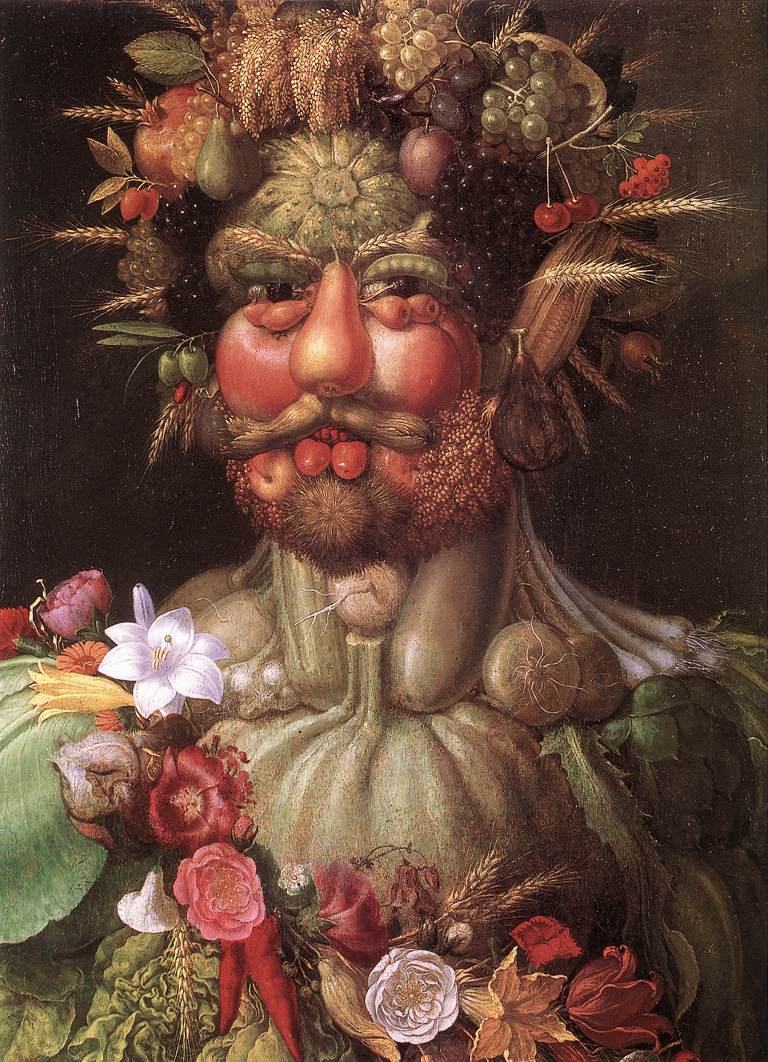- Vertumnus
In
Roman mythology , Vertumnus (Vortumnus, Vertimnus) is the god of seasons, change [" Vertumnus then, that turn'st the year about," (Thomas Nashe , "Summer's Last Will and Testament" (1592, printed 1600).] and plant growth, as well as gardens and fruit trees. He could change his form at will; using this power, according toOvid 's "Metamorphoses " (xiv), he trickedPomona into talking to him by disguising himself as an old woman and gaining entry to her orchard, then using a narrative warning of the dangers of rejecting a suitor (the embedded tale ofIphis andAnaxarete ) to seduce her.David Littlefield has read in the episode a movement fromrape to mutual desire, effected against an orderly, "civilised" Latian landscape [David Littlefield, "Pomona and Vertumnus: a fruition of history in Ovid's "Metamorphoses" "Arion" 4 (1965) p 470.] Conversely,Roxanne Gentilcore reads in its diction and narrative strategies images of deception, veiled threat and seduction, in which Pomona, the tamedhamadryad now embodying the orchard, does not have a voice.The tale of Vertumnus was the only purely Latin tale in Ovid's "Metamorphoses". The name "Vortumnus" appears to derive from Etruscan "
Voltumna ". It was likely then further contaminated in popular etymology [As given bySextus Propertius , "Elegy" 4. Propertius' editor L. Richardson Jr. (1977)notes that thes etymology is not philologically sound.] by a pre-existing Latin word "vertēre" meaning "to change", hence the alternative form, "Vertumnus".Ovid recalled a time ("Fasti ", vi, June 9 "Vestalia") when theRoman forum was still a reedy swamp, when:That god, Vertumnus, whose name fits many forms,:Wasn’t yet so-called from damming back the river ("averso amne").
Vertumnus' cult arrived in Rome around 300 BC, and a temple to him was constructed on the
Aventine Hill in264 BC .Sextus Propertius ' elegy instancing Vertumnus ("Elegy" 4.2.41-46) refers to a statue of him that was placed at theVicus Tuscus and decorated according to the changing seasons. His festival was the Vertumnalia onAugust 13 .The subject "Vertumnus and Pomona" appealed to European sculptors and painters of the sixteenth through the eighteenth century for its opportunity to contrast young fresh female beauty with an aged crone, providing a wholly disguised erotic subtext, [Similar subtly pornographic uses were made of the theme of Zeus disguised as Diana, and Callisto.] though Ovid does remark that the kisses given by Vertumnus were such as an old woman would never have given: ["qualia numquam vera dedisset anus". "So Circe's smile conceals a wicked intention, and Vertumnus' hot kisses ill suit an old woman's disguise", notes Donald Lateiner, "Nonverbal Behaviors in Ovid's Poetry, Primarily 'Metamorphoses' 14" "The Classical Journal" 91.3 (February - March 1996:225-253).]The subject was even woven into
tapestry in series with the generic theme "Loves of the Gods", of which the mid-sixteenth century Brussels hanging atMuseu Calouste Gulbenkian , Lisbon, woven to cartoons attributed toJan Vermeyen , must be among the earliest.François Boucher provided designs for the tapestry-weaverMaurice Jacques at the Gobelins tapestry manufactory for a series that included "Vertumnus and Pomona" (1775 - 1778), and, extending the theme of erotic disguise, "Jupiter wooing Callisto in the guise of Diana": an example is at theJ. Paul Getty Museum .Mme de Pompadour , who sang well and danced gracefully, had played the role of "Pomone" in apastoral presented to a small audience at Versailles; [ [http://www.threeweb.ad.jp/~nityshr/fronbun/dvpastoral.htm "Pourquoi "Le Devin du Village " est un pastorale?"] ] the sculpture byJean-Baptiste Lemoyne (1760) alludes to the event.Notes
thumb|150px|right|Emperor_Rudolf II as Vertumnus, byGiuseppe Arcimboldo (now atSkokloster Castle , Sweden).]References
* [http://www6.miami.edu/lowe/art_greco_roman.htm Statue of Vertumnus in the Lowe Museum]
* [http://www.museu.gulbenkian.pt/obra.asp?num=2329&nuc=a10&lang=en Museu Gulbenkian tapestry]
* [http://www.getty.edu/art/gettyguide/artObjectDetails?artobj=6166 Getty Museum tapestry]
*Roxanne Gentilcore, "The Landscape of Desire: The Tale of Pomona and Vertumnus in Ovid's 'Metamorphoses'" "Phoenix" 49.2 (Summer 1995) pp. 110-120.
Wikimedia Foundation. 2010.

